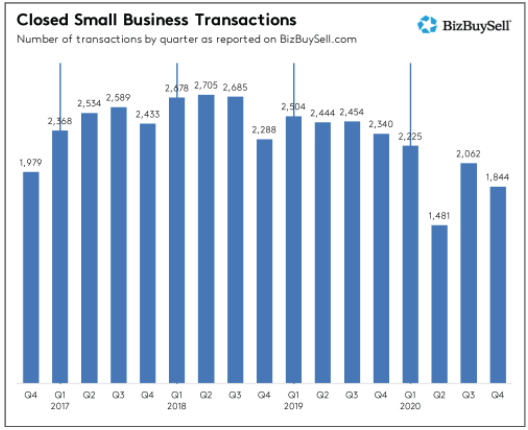
BizBuySell Insight Report- Acquisitions Drop 22% in 2020, Thriving Businesses Sell at Record Prices
As we move away from 2020 and into 2021 it’s interesting to see the impact of the Pandemic on business sales last year. BizBuysSell’s recent Insight Report recaps a number of data points from 2020.
The number of small businesses reported sold in 2020 dropped 22% compared to 2019. This was the largest year-over-year drop since 2009 at the start of the Great Recession when transactions dropped 28%.
A total of 7,612 businesses were reported as acquired in 2020, compared to 9,746 in 2019. Conversely, the median sale price rose 12% to $279,950, with revenue and cash flow reaching record highs, according to BizBuySell’s Insight Report, which tracks and analyzes U.S. business-for-sale transactions and sentiment of business owners, buyers, and brokers.
While transactions slowed, the median cash flow of sold businesses grew 10.7% over 2019 to $135,567, while revenue increased 8.2% to $613,341. The impressive financials speak to the quality of businesses changing hands – specifically, the spiking demand for pandemic resistant businesses, while weaker deals remained sidelined.
Heading into 2020, the business-for-sale market was strong, with a steady supply of profitable businesses from retiring Baby Boomers being scooped up by a new generation of buyers. Then in March, as much of the U.S. went into lockdown, owners postponed transitions and buyers paused their search, while banks froze lending. By the end of the month, March transactions had dropped 43%, swinging first quarter sales down 11% year-over-year.
Click here to access the full report
Read More

Maximizing Your Time by Rating Buyer Seriousness

Your time is your most valuable commodity. The simple fact of the matter is that many “buyers” are not truly buyers. In contrast, they are often window shopping or acting out a fantasy of buying a business. In other cases, they would only plan to buy if they were to find the “deal of the century.” The last thing you want to do is waste your time trying to work out deals with people who aren’t serious or qualified buyers.
The Plus and Minus System
The best way to find a serious buyer is to use a “plus and minus” system. This system will help you weed out the window-shoppers from buyers that are truly worth your time.
First, let’s evaluate factors for which you’ll want to deduct points. If a buyer needed outside financing, then subtract 4 points. Likewise, if a buyer has been looking for 6 months or more, you’ll want to also subtract 4 points. If a buyer has no cash available, you should subtract 3 points. Additionally, if a buyer is currently working in the corporate world, you should also subtract 3 points. These are the 4 largest reasons to subtract points, but they are not the only reasons.
Below are a few reasons to subtract 2 or 1 points from a buyer’s rating.
- You learn the spouse is not supportive – Subtract 2
- Prospective buyer uses a legal pad or clipboard and takes copious notes – Subtract 2
- The buyer indicates that they are in “no rush” and want to find the perfect business – Subtract 2
- The buyer is under the age of 25 or over the age of 62 – Subtract 1
- The buyer is currently renting even though he or she has lived in the area for some time – Subtract 1
Factors to Add Points In
There are also many factors that would make a buyer fall onto the “plus” side. If the prospective buyer does not currently have a job or has just resigned from their job, then add 3 points. Likewise, if a prospective buyer acknowledges that books and records are not the only metrics by which to judge a business, add 3 points.
Add 2 points if a buyer has enough money to buy the business and another 2 points if the buyer currently has no dependents. If a close relative or family member currently owns or has owned a business in the past, then add 2 points. If the buyer is between the ages of 25 and 62 add 1 point. If he or she is a skilled worker or professional, add 1 point. Finally, if the buyer does not consider location to be a prime consideration, add 1 point.
This streamline, straightforward and relatively simple system does work. Use this system consistently, and you will quickly eliminate a large percentage of window shoppers. While no system is perfect, this “plus-minus” system for accessing prospective buyers will save you countless hours and many potential headaches.
Copyright: Business Brokerage Press, Inc.
The post Maximizing Your Time by Rating Buyer Seriousness appeared first on Deal Studio – Automate, accelerate and elevate your deal making.

Ownership Transition Survey Results on feedback and answers from family-owned businesses

Mass Mutual Life Insurance produced an ownership transition survey back about a decade ago. The survey results were based on feedback and answers from family-owned businesses. It produced some very interesting results, and is worth examining even today. While the survey at this point is quite outdated in terms of the timeline, there are still many valuable nuggets of information to be gleaned from it. Let’s dive in and take a closer look at the numbers and what they can tell us for 2021 and beyond.
While the Mass Mutual Life Insurance ownership transition survey had a range of important points, the one that leaps right off the page is the fact that a whopping 80% of family-owned businesses are still being controlled by their founders. A large percentage of those founders are Baby Boomers who will have little choice but to retire in the next few years.
The survey indicated that 55% of CEOs over the age of 61 or older have yet to choose a successor. This fact serves to emphasize the fact that a “retirement wave” will hit family-owned businesses, and this will lead to some interesting shifts and opportunities. And while the survey indicated that 13% of CEOs state they will never retire, the reality of the situation is that ownership will eventually change hands. Business brokers can expect to see an unprecedented wave of interest in their services. Additionally, prospective buyers will also have a highly unique opportunity to buy established businesses.
The survey also indicated that 30% of family-owned businesses will be changing leadership within the next five years. Of course, with that change of leadership, many possibilities open up, including the possibility of selling. However, it is important to note that while there will be a “retirement wave” amongst the Baby Boomers, not all businesses currently owned by Baby Boomers will be placed on the market.
The survey noted that 90% of businesses currently plan on remaining family-owned, and 85% of businesses plan on having their next CEO be a family member. However, it is important to keep in mind that even if these numbers were to hold true, that means at least 10% of businesses will be up for sale.
It is likely that this number is far higher now than when the survey was conducted due to the aging nature of the Baby Boomer population and owners looking to sell because of pandemic related issues. Simply stated, there will be no shortage of businesses for sale in 2021 and beyond.
Another important aspect of the survey to consider is the fact that family-owned businesses are not prepared to sell. According to the survey, 20% of family-owned businesses have not completed any form of estate planning, and 55% of family owners do not have any formal company valuation for estate tax estimates. Combine these statistics with the fact that 60% of businesses do have a written strategic plan, and it becomes clear that family-owned businesses, especially those considering selling in the future, are most definitely in need of professional assistance. Many family-owned businesses are ill prepared for the future and have a range of vulnerabilities. Business brokers and M&A advisors are uniquely positioned to provide those services.
Copyright: Business Brokerage Press, Inc.
The post Ownership Transition Survey Results on feedback and answers from family-owned businesses appeared first on Deal Studio – Automate, accelerate and elevate your deal making.
